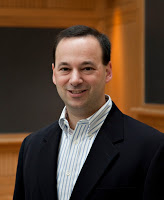- Public Policy
- Leadership
- Funding
- News & Events
- About the Center
Back to Top Nav
Back to Top Nav
Back to Top Nav
Back to Top Nav
Rockefeller Center Director Andrew Samwick provides commentary on a variety of issues in the Direct Line, which is published at the start of each term.
In my spring 2007 “Direct Line,” I noted that the 2008 Presidential primary season was off to an unusually early start, with many of the candidates in a crowded field visiting campus. I particularly enjoyed visits by Senator Barack Obama, who captivated a crowd of several thousands assembled in the courtyard outside the Rockefeller Center on Memorial Day, and by former Governor Mike Huckabee, who delighted the group of students who took a study break during finals to hear him in the Center’s Class of 1930 Room.
We are honored to begin our fall term with a visible event of national importance. But, when the lights from the cameras dim and the candidates move on to other venues, it is the study of public policy and the social sciences that will guide our programming. This year, we are particularly enthusiastic about two of our continuing programs.
The Center’s Policy Research Shop (PRS) is the beneficiary of a $300,000/three-year funding commitment from the Ford Foundation to expand and improve its operations. This innovative program begins with our fall term course, Introduction to Public Policy Research, in which Dartmouth students learn to conduct objective research in support of the New Hampshire and Vermont state legislatures and local governments. Students then continue in the PRS for one term of academic credit or in paid research assistantships. In the past few years, several groups of students have had the opportunity to testify on their research before legislative committees and working groups in the two states. With the infusion of resources from the Ford Foundation, we look forward to increases in the quality and quantity of work in the PRS.
Some of the fall PRS researchers will have just returned from internship in Washington, DC, through the Center’s First-Year Initiative (FYI). Launched last winter for the Class of 2010, the FYI integrates the Center’s curricular and co-curricular programs to provide students with opportunities to meaningfully engage in public policy early in their Dartmouth careers. With the help of the Dartmouth Club of Washington, DC, we placed 13 Dartmouth students in public policy internships in the nation’s capital under the guidance of Dartmouth alumni. These students were selected for the program based on their superior performance in the public policy minor gateway course Introduction to Public Policy. Based on FYI’s maiden voyage success, we now look forward to offering the same opportunities to the Class of 2011.
It is through programs such as these—whether in or out of the classroom, on or off campus—that the Rockefeller Center seeks to educate, train, and inspire the next generation of public policy leaders
 Andrew A. Samwick is the Director of the Nelson A. Rockefeller Center for Public Policy and the Social Sciences, the Sandra L. and Arthur L. Irving '72a, P'10 Professor of Economics at Dartmouth College, and a research associate of the National Bureau of Economic Research. In 2003 and 2004, he served as chief economist on the staff of the President’s Council of Economic Advisers.
Andrew A. Samwick is the Director of the Nelson A. Rockefeller Center for Public Policy and the Social Sciences, the Sandra L. and Arthur L. Irving '72a, P'10 Professor of Economics at Dartmouth College, and a research associate of the National Bureau of Economic Research. In 2003 and 2004, he served as chief economist on the staff of the President’s Council of Economic Advisers.